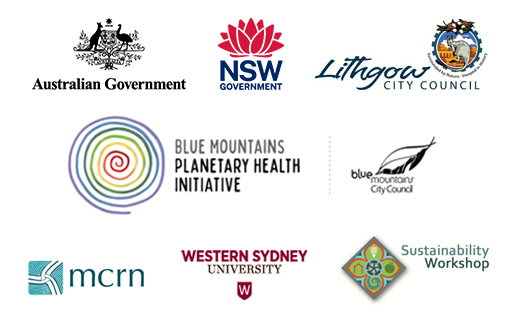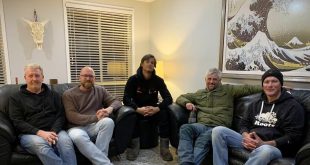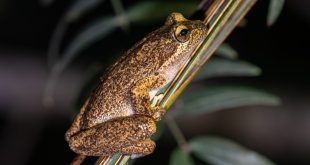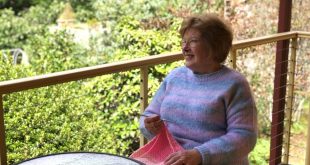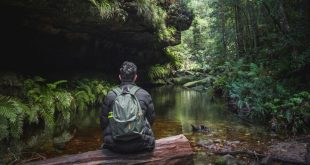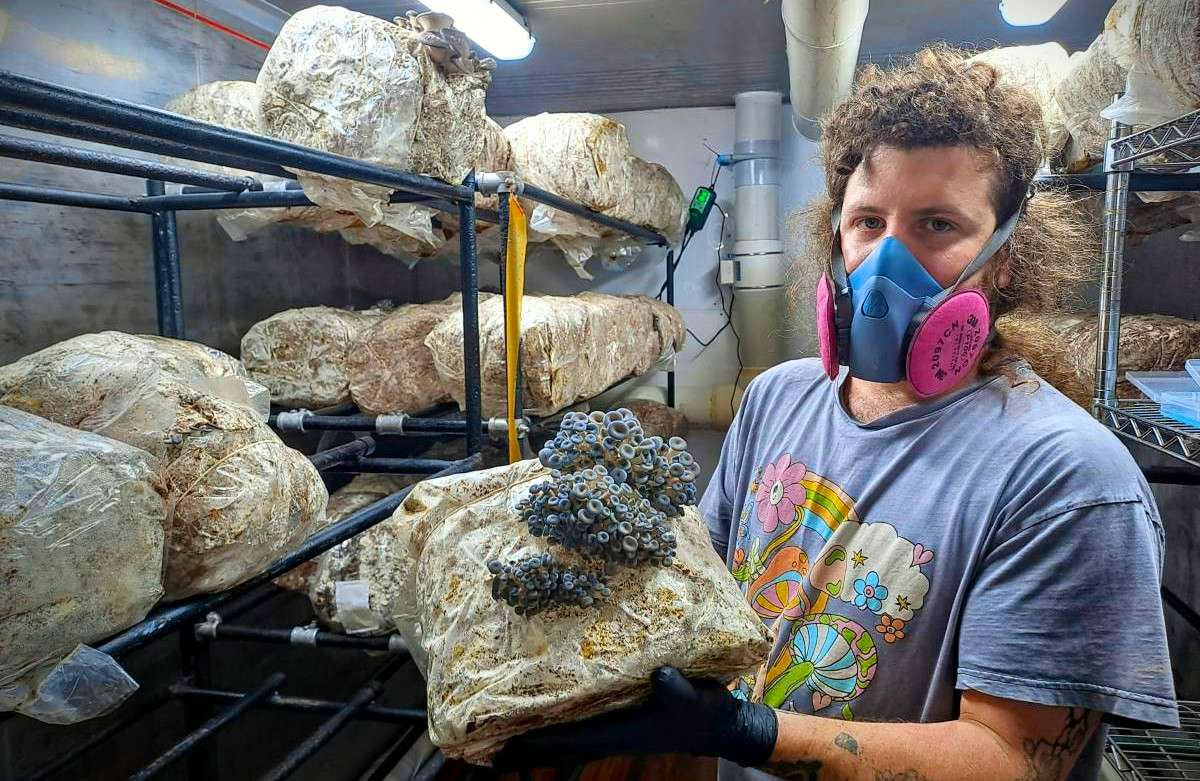
Alex Felix at EarthRising Mushroom Farm with his Blue Oyster mushrooms.
Story and photos by Belle Butler
Fungi fever? Mushroom madness? Mushrooms are a hot topic at the moment with more and more research illuminating the essential role these organisms play in the health of the planet as well as the significant health and medicinal benefits they hold for humans. Belle Butler visited local mushroom grower, Alex Felix, at his farm in Lawson to talk about the mighty mushroom.
Key Points:
- Fungi are essential for life on the planet.
- Fungi are a promising solution for multiple environmental problems.
- Edible mushrooms have numerous health benefits and, high in protein, offer a sustainable option for meat substitution.
Back in the ’80s and ’90s when I was growing up, mushrooms on the dinner plate invited fierce protests from kids at large. There seemed to be only one edible variety – the good old button mushroom – and it was usually prepared in a way that made you feel like you were chewing up slimy eyeballs.
How far we have come! With the scientific and popular focus on fungi in recent years, one might say we are in the age of the mushroom. From culinary delicacy to medicine, environmental saviour to psychological healer, the uses and functions of this organism are extensive.
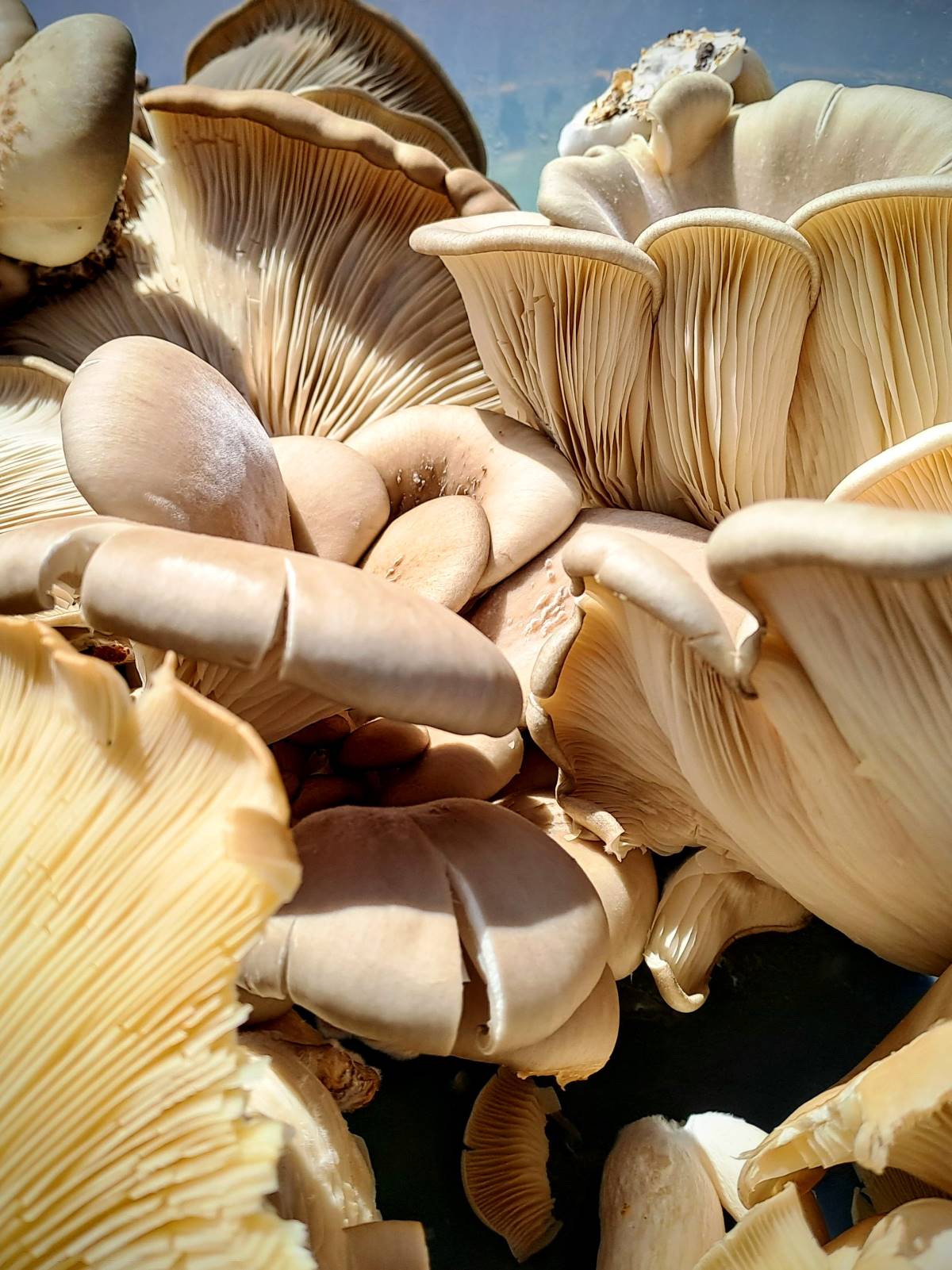
Oyster Mushrooms showing off their gills and frills at Earthrising Mushroom Farm.
Local fungi enthusiast and grower, Alex Felix of Earthrising Mushroom Farm in Lawson, is a keen advocate for the benefits of mushrooms for human health and the planet alike.
Originally from France and with a background in creative arts, Alex moved to Australia with his partner two years ago in an act of eschewing the stresses of life he experienced living in cities. “I was in need of nature and big spaces. Moving here was part of a big shift in my life. At the same time as my move to Australia I also became a father, and this coincided with a new passion and business I have never done before – giving life to mushrooms!”
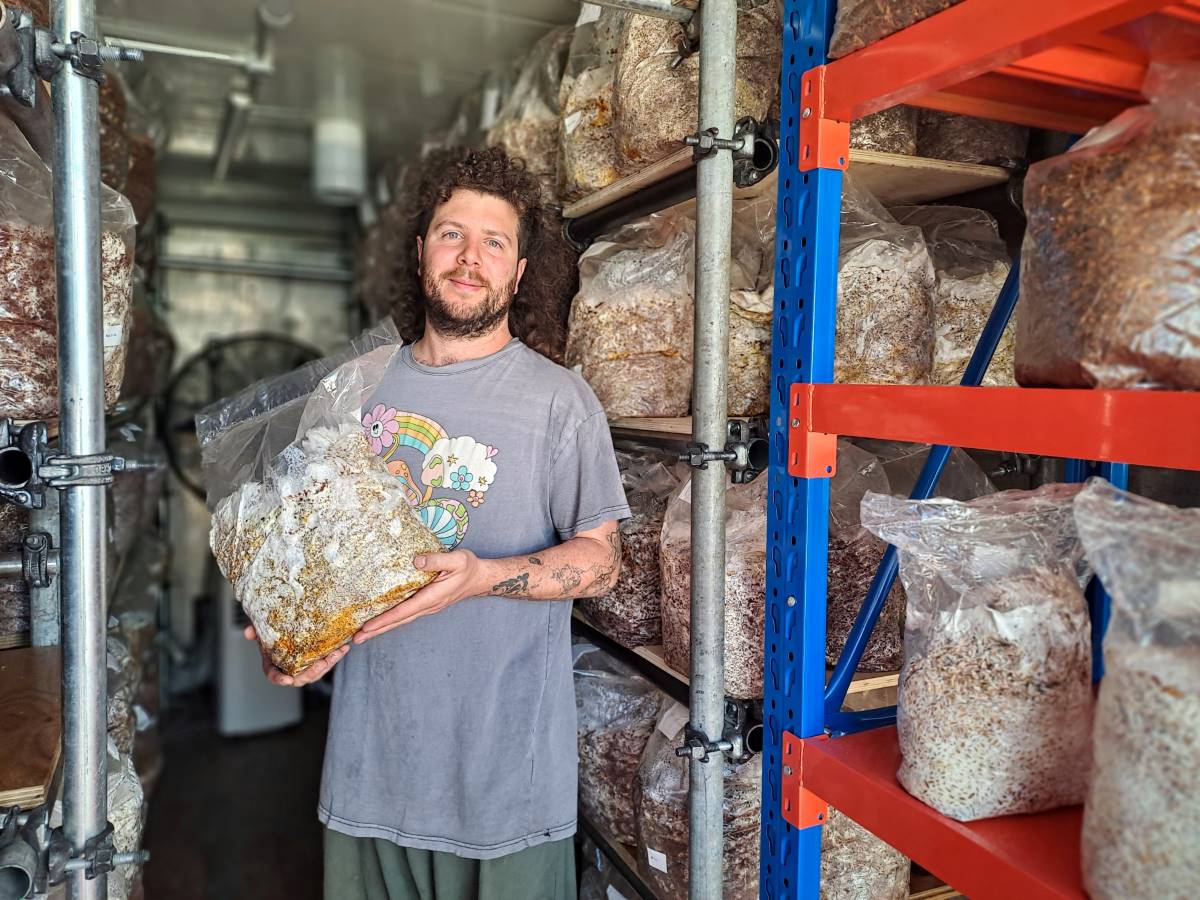
Alex holding an inoculated substrate at his Earthrising Mushroom Farm in Lawson.
Alex credits his interest in mushrooms to a broader curiosity about growing food after city life left him feeling disconnected from these processes. “One day I finally had my own garden to experiment with and this is where I started to learn. Naturally I came across permaculture practices and couldn’t stop until I had learned about how everything is intertwined and works together,” he said.
“I was fascinated about how easy it is to grow things when you know what you are doing, and then from permaculture to mushroom farming was just the next intuitive step in my journey. I just followed my instinct and went deep-diving into it, and here I am.”
A time lapse of oyster mushrooms growing in one of Alex’s mushroom grow kits
Alex created Earthrising Mushroom Farm with Sydney-based business partner and brother-in-law Naji. With sustainability at the forefront of his mind, Alex built the farm out of 80% second-hand or repurposed materials, and to reduce energy consumption, he works with the seasons, growing summer strains during the warmer months and winter strains during the cooler months.
As much as he can, he buys what he needs for the farm within a 100km radius, and the waste of his product – soil-loving mushroom compost comprised of sawdust and mushroom mycelium – can be purchased for $2 a bag (minimum 10 bags) from the farm.
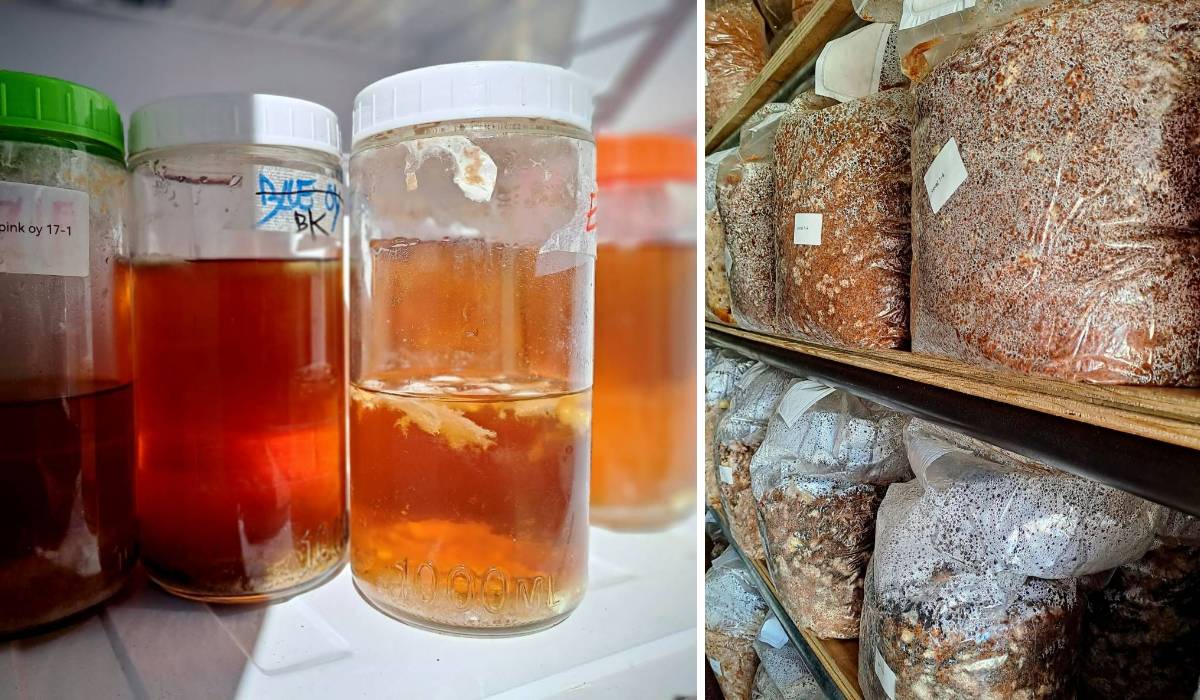
Left: Water culture used to inoculate the sterilised substrate. Right: Inoculated substrate where mycelium will begin to grow.
“Something I am very happy about is working on a circular economy model,” Alex said. “I recycle the waste of the local wood workshops by using their sawdust as a growing medium for the mushroom. And it transforms the sawdust into mushroom compost that goes back to earth. Gardeners and locals come to pick up the compost for their garden or veggie patch. This is gold for the soil, providing nutrients for plants, and improving soil structure, friability, and permeability. It boosts root growth and soil’s water-holding capacity, ensuring adequate moisture for plants.”
Supplying local restaurants and selling directly to the public, Alex feels a sense of gratitude for the opportunity of providing the local community with fresh nutrient-dense gourmet mushrooms, including the rare varieties of Lion’s Mane and the tropical Pink and Yellow Oyster mushrooms. He is also currently experimenting with creating his own supplements using dried Reishi mushrooms, which he hopes to sell in the near future.
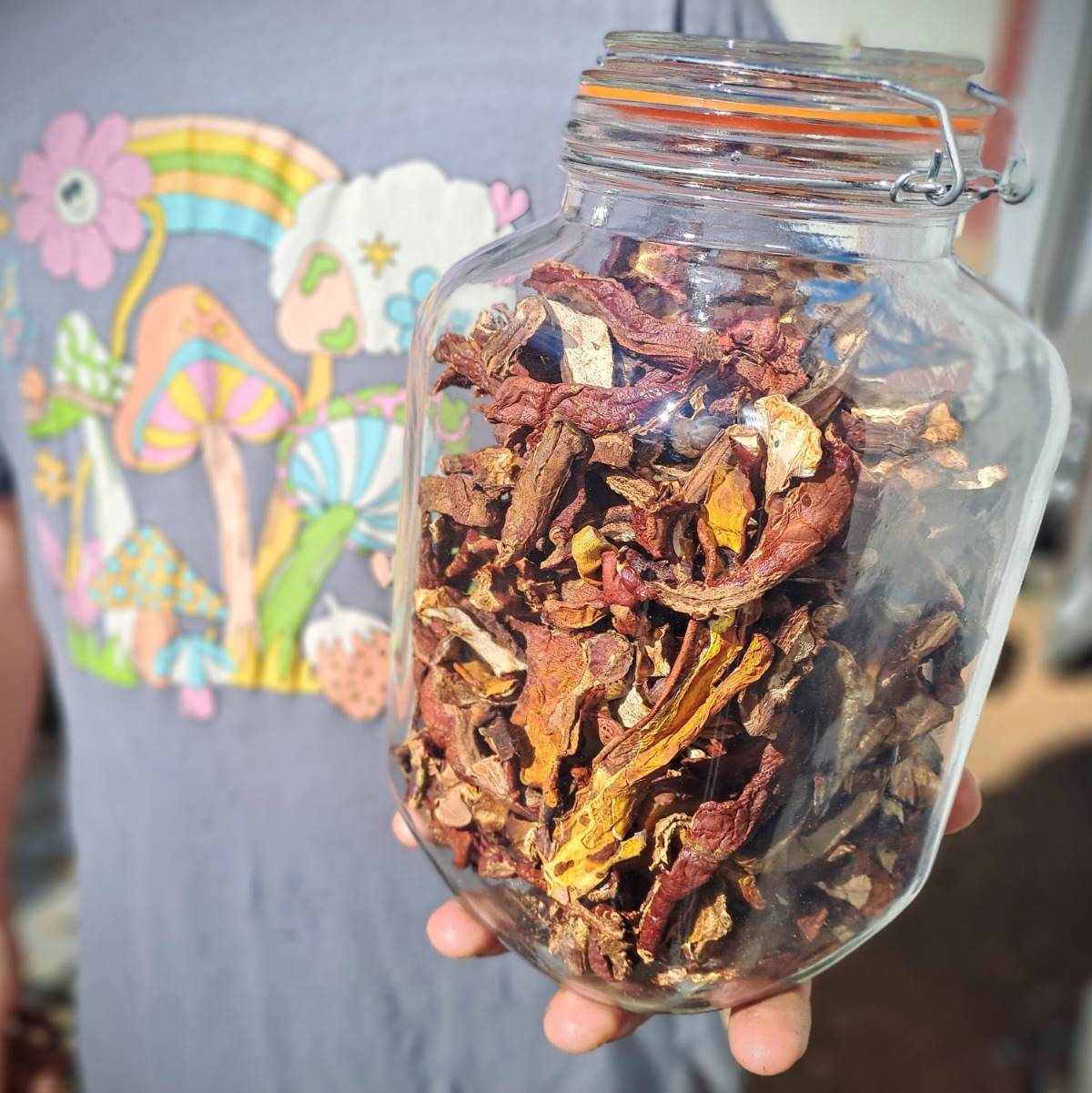
Dried Reishi mushrooms that Alex hopes to turn into a powdered supplement.
So What Makes Mushrooms So Amazing?
As Alex puts it: “The mushroom kingdom is like an octopus, with so many tentacles or branches to work with: fresh produce, architecture, object design in mycelium, environment (myco-remediation), medicinal product.”
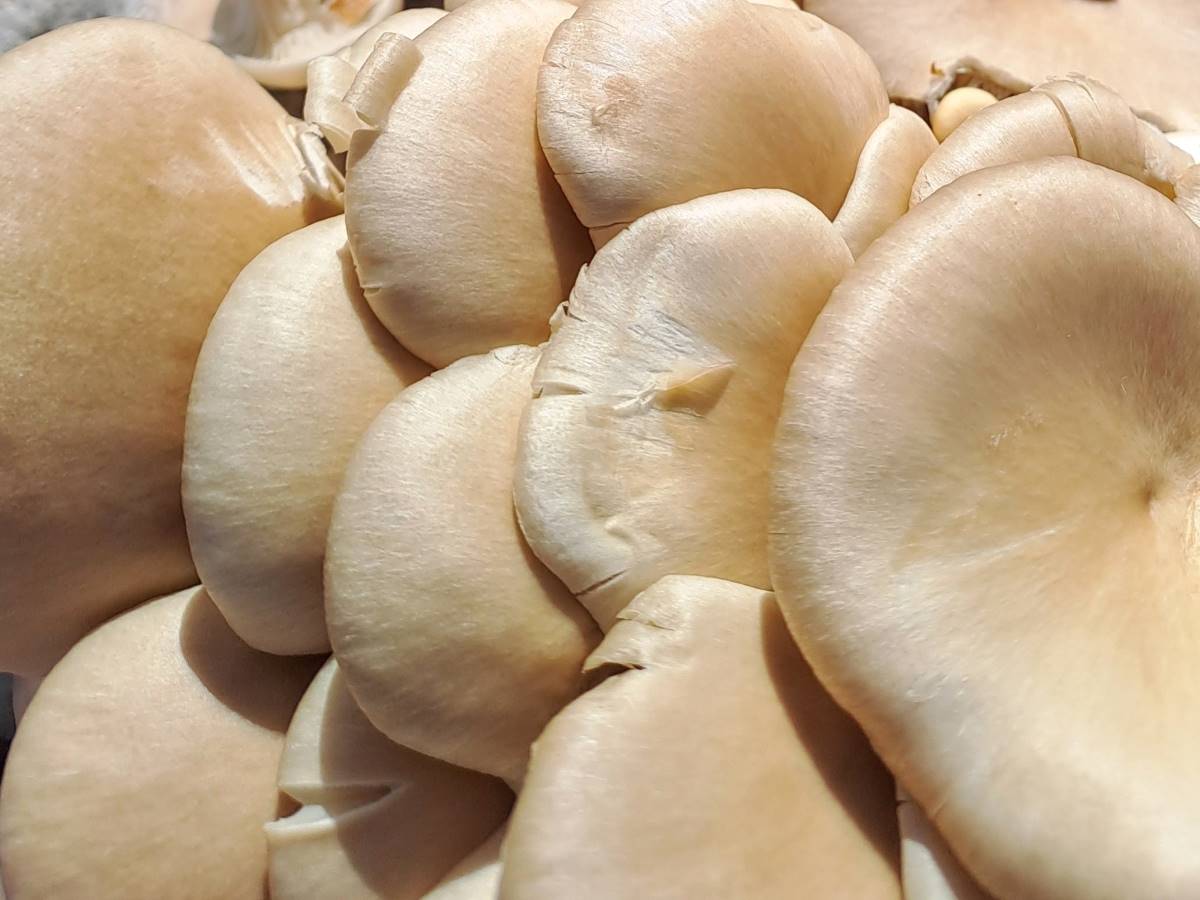
Pearlescent tops of Oyster mushrooms from Earthrising Mushroom Farm.
In the wild, fungi are essential to life on the planet. More than 90 percent of plants rely on symbiotic fungi for nutrients and defence against disease. Fungi are the primary degraders of organic matter, turning dead matter into nutrients for other organisms, and the mycelium of fungi (similar to root systems) binds soils together, and carries water, nutrients and chemical signals through its vast networks.
As a fresh product, foraged or farmed, mushrooms are a sustainable protein offering promising outcomes for the future of food security. Packed full of fibre and essential vitamins and minerals, mushrooms have been purported to hold many health benefits including:
- Possibly decreasing the risk of cancer
- Lowering cholesterol and improving heart health
- Boosting the immune system
- Lowering blood sugar
- Improving gut health
- Reducing the risk of cognitive decline.
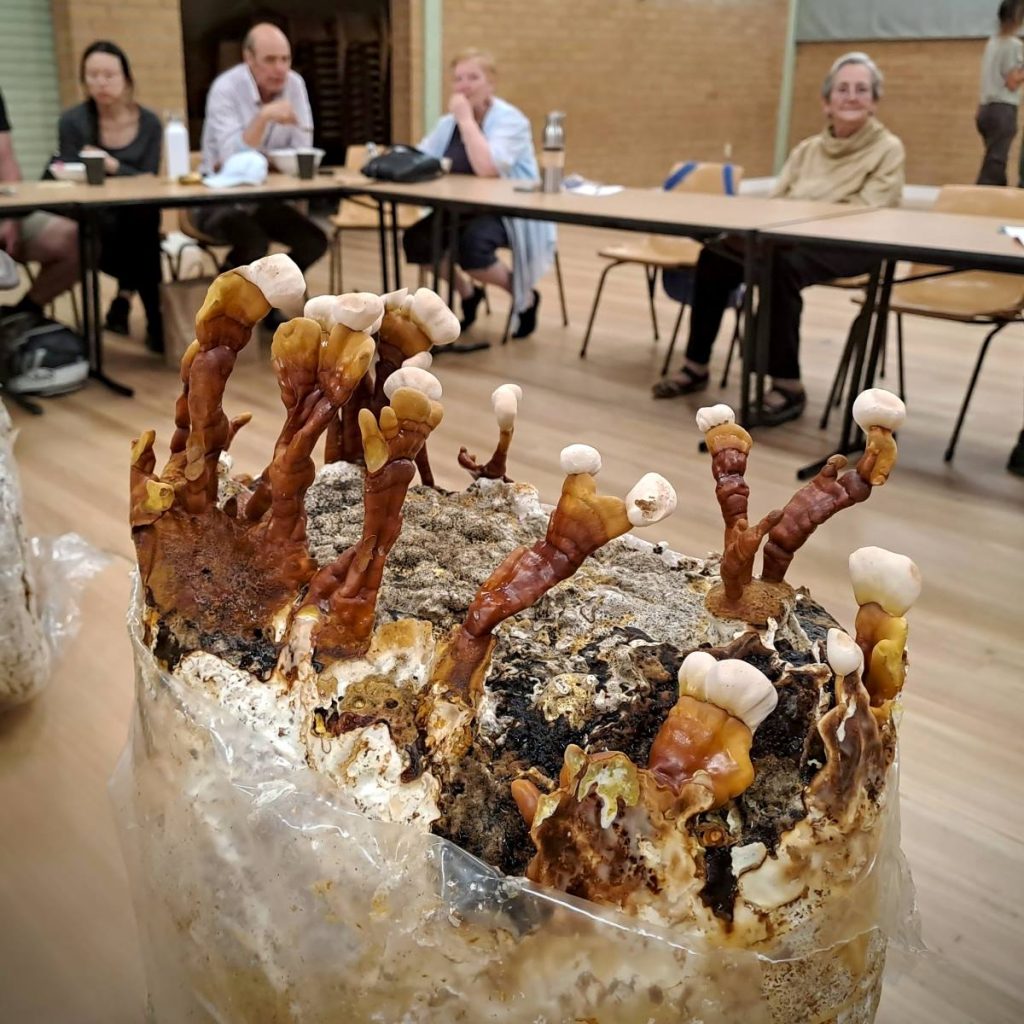
Reishi mushroom, commonly used for medicinal purposes, on show at a Permaculture Blue Mountains event at Mid Mountains Neighbourhood Centre, Lawson.
One of the mushrooms Alex grows at Earthrising, the Lion’s Mane variety, is the subject of much research about its potential health benefits for the brain.
“Numerous healthy plant compounds can be found in Lion’s Mane mushrooms,” said Alex. “According to research, these substances may support the gut, heart, and stimulate the immune system, help the growth of new brain cells, as well as alleviate depression and anxiety. Lion’s Mane is also recommended for people with ADHD, as it can act as a brain enhancer by improving focus and short-term memory. That’s the main reason why people take lion’s mane powder as a food supplement.”
As a medicinal product, psilocybin (commonly called magic mushrooms) is also undergoing significant research for its use in psychological healing. “I am particularly impressed by the Australian government that reclassified last year the therapeutic use of the psilocybin used in psychedelic-assisted therapy to treat mental health conditions like PTSD and depression,” Alex said.
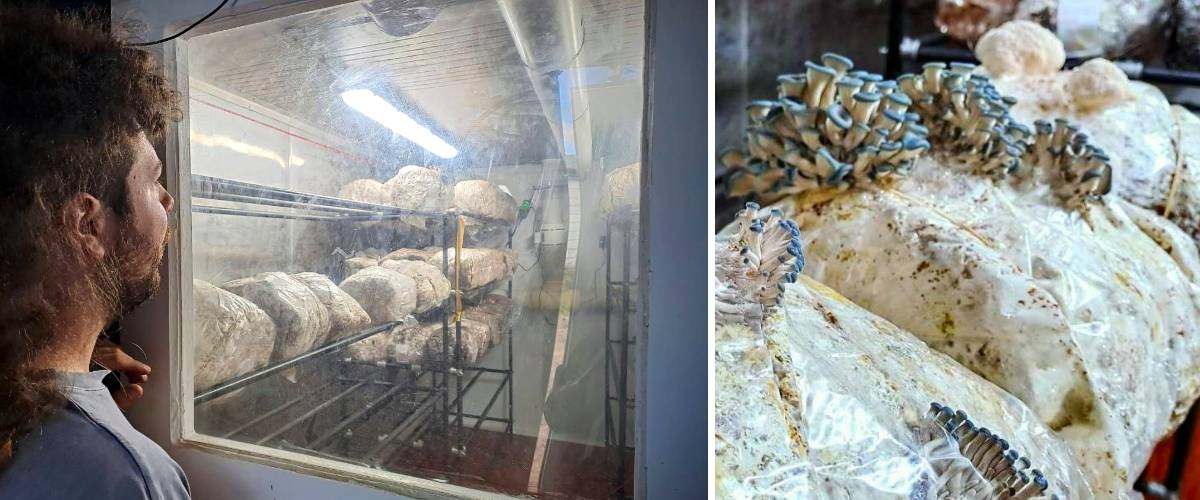
Left: Alex created a viewing door for visitors to observe the growing process without contaminating the space or breathing in spores. Right: Young Blue Oyster mushrooms on the rise with Lion’s Mane in the background.
Mushrooms’ restorative properties don’t stop at human health. Researchers are finding more and more ways that mushrooms can help restore the health of the planet. From cleaning contaminated soil and degrading plastics to filtering contaminated water, mycelium can be used to break down and absorb pollutants and restore ecosystems. Mycelium is also being used for innovative creations such as sustainable building materials, sustainable ‘leather’, faux-meat products, and compostable packaging.
“Mushrooms are here to help us,” said Alex. “We are just at the beginning of understanding it. The only challenge is to find solutions on how to scale up these discoveries. If one day we can decompose a full landfill of plastic with mushrooms that would be amazing.”
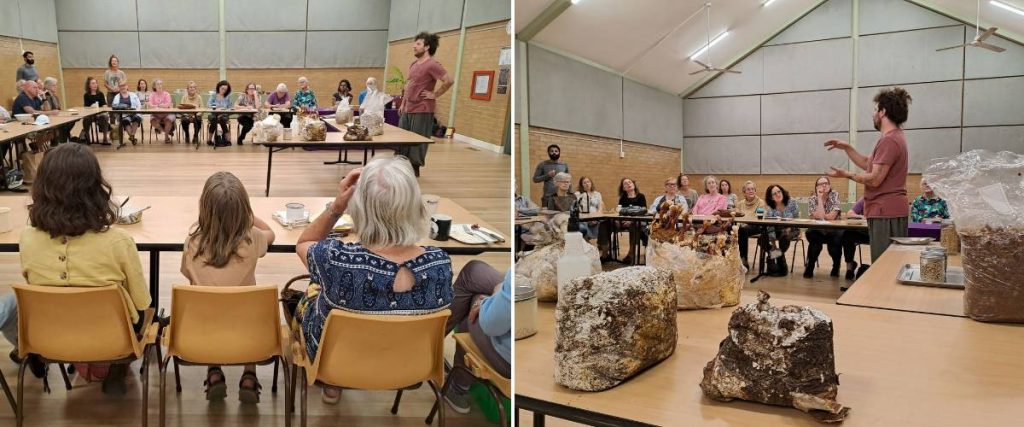
Alex talked to an engaged audience at a Permaculture Blue Mountains event about the process of growing mushrooms.
Also interested in mycelium-based products, Alex believes that that this material can revolutionise many industries. “Mycelium-based materials are biodegradable, consume little energy and have a low carbon footprint. They’re also relatively cheap and offer good fire, thermal and acoustic insulation. It can be a good alternative to plastic for the packaging industry to replace polystyrene, for example, which is terrible for the environment. Also in the building industry, insulation panels can be made to insulate a house, and it’s fireproof.”
Intrigued by the potential uses of mycelium, Alex is experimenting with Reishi mycelium blocks which he has placed outdoors to monitor their endurance over the course of a year. “I will start to work on some moulds to shape some objects and see what works best,” he said. “Doing garden beds or pot plants in mycelium can be nice. And why not a new type of mycelium-based Esky to go to the beach?”
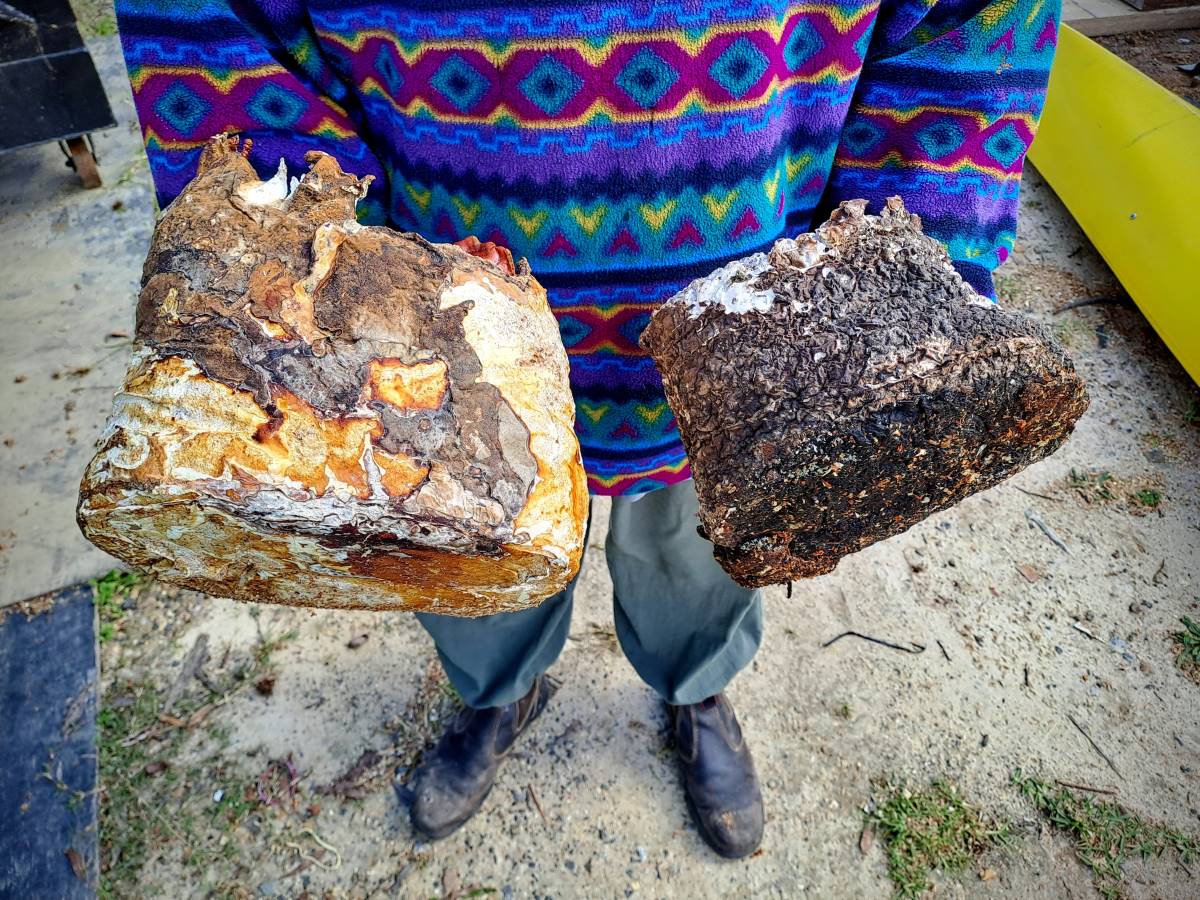
Reishi mycelium blocks at different stages of weathering.
Alex is committed to sharing his produce and knowledge with the Blue Mountains community. He was recently an invited guest speaker at a Permaculture Blue Mountains event at the Mid Mountains Neighbourhood Centre in Lawson, and he has started to run workshops in which he teaches people how to grow mushrooms at home: “I hope one day everyone knows how to grow mushrooms the same way we know how to grow a tomato plant.”
Contact Alex to buy fresh mushrooms, grow kits, liquid culture, or mushroom compost direct from the farm, or catch him at RoseyRavelston Mini Markets on Thursday afternoons from 4-7. Alex’s mushrooms are used at local restaurants Arrana, Lot101, Ates, Blaq., Darley’s, and Black Cockatoo Bakery, and can also be purchased at the Blue Mountains Food Co-Op in Katoomba.
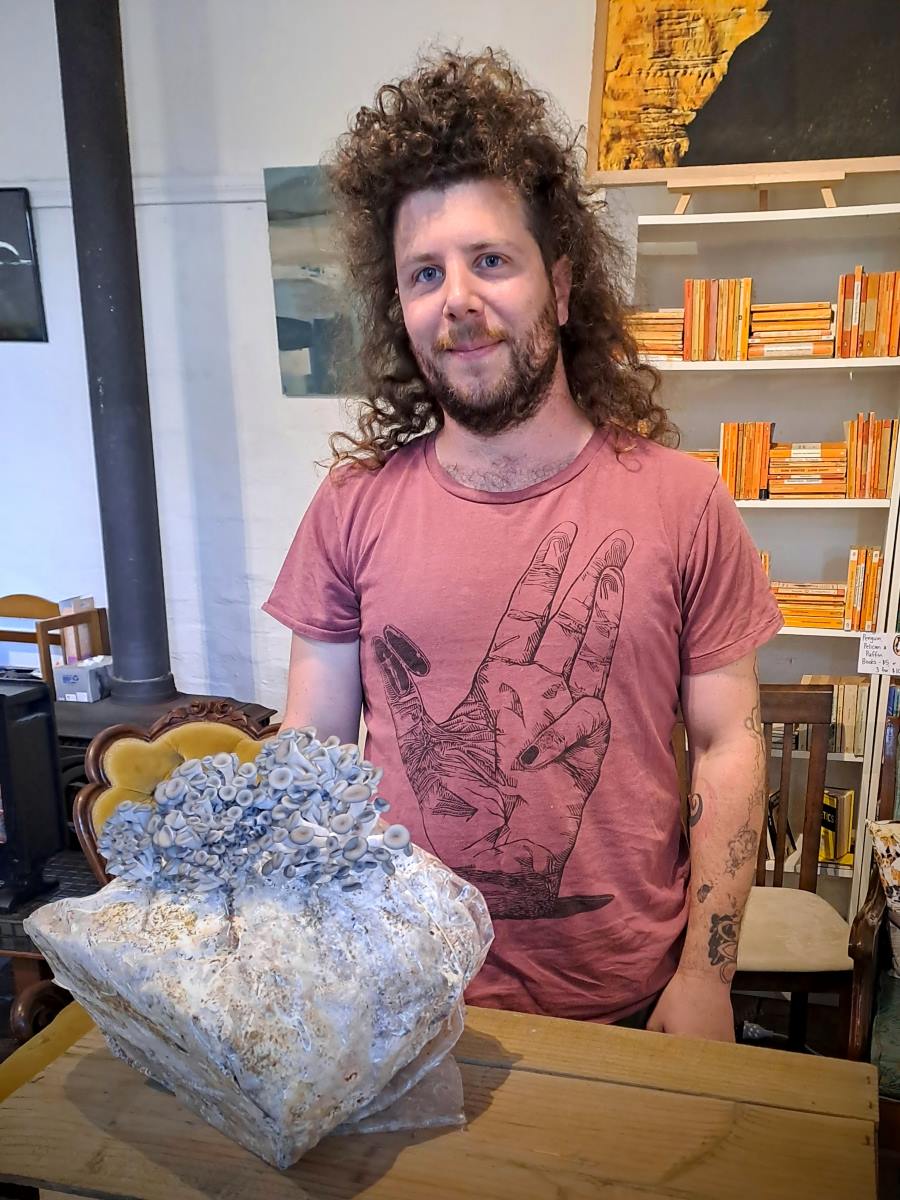
Alex selling his produce and growing kits at RoseyRavelston Books Mini Markets in Lawson.
If you would like to learn how to grow Lion’s Mane and use it medicinally, Alex will be hosting a workshop with Middle Path Medicine on May 4 in Katoomba. Event details here.
Further Reading:
- Mycoremediation brings the fungi to waste disposal and ecosystem restoration (mongabay.com)
- 5 ways fungi could change the world, from cleaning water to breaking down plastics (theconversation.com)
- 5 sustainable alternatives with use of Mushrooms Mycelium | World Economic Forum (weforum.org)
- How mushrooms, microorganisms could transform food packaging | World Economic Forum (weforum.org)
Suggested Viewing:
Share this article:
This story has been produced as part of a Bioregional Collaboration for Planetary Health and is supported by the Disaster Risk Reduction Fund (DRRF). The DRRF is jointly funded by the Australian and New South Wales governments.
